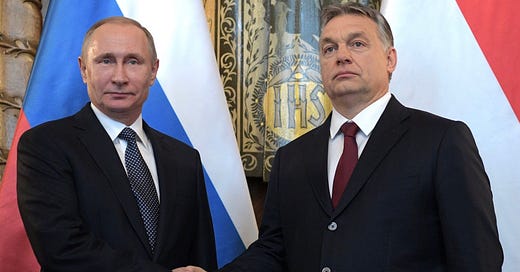The Anti-Liberal Internationale
From the EU to the United States, reactionaries imagine a world order shaped by xenophobic, culturally conservative states
Liberal internationalism broadly holds that democratic structures, cooperation through international organizations and trade agreements, and shared commitments to conventions like human rights law can temper the tendencies for conflict between states. But for 21st century anti-liberals, international politics is divided not by how nation-states structure their governments and economies, but by how they structure the family and wider demographic conditions. For this set, the paramount concerns are promoting native-born population growth—at least from the majority ethnic group—choking global migration, and cracking down on LGBTQ+ rights.
This January, Hungarian president Viktor Orbán declared that his commitment to anti-LGBTQ policies could not be undone by EU “propaganda”—which in this case means criticism—and a threat of frozen funds. Under Orbán, Hungary has been at the cutting edge of right-wing, anti-liberal, supposedly pro-family politics in the West. This has generated growing frustrations in Brussels, culminating most recently in the European Parliament passing a non-binding resolution condemning Hungary’s LGBTQ+ and migrant policies. For his part, Orbán defiantly insisted Hungarians would neither tolerate “mass migration” nor “put our children in the hands of LGBTQ activists.” His political director took to X (née Twitter) to say the European Parliament should be abolished and reformed in a shape more amenable to the Orbánist vision.
Some on the American right are eager to export elements of Orbánism to the U.S. and other Western democracies. Gladden Pappin, an American academic who now serves as president of the government-backed Hungarian Institute of International Affairs, has argued for family policy as a cornerstone of illiberal foreign policy. Pappin claims:
Western governments, as well as popular culture, have also placed greater emphasis on defending and even celebrating alternative lifestyles than on the classical definition of the family…The arrival of demographic policy as foreign policy is also a sign that the “values” identified at the heart of the existing global order are considered by many global actors to be insufficient to power it.
Pappin’s arguments reflect a desire among many on the right to use state power to not only cultivate preferable demographic conditions, but to transmit hardline views in a black mirror of liberals’ understanding of institutional networks and consensus building.
In 2022, Blake Masters, the former Senate candidate from Arizona now running for the House, enthusiastically embraced the “Great Replacement” conspiracy theory while flirting with draconian bans on contraceptives. Masters also decried Washington foreign policy as “money we don’t have on wars that achieve nothing so the trans-BLM flag can fly all across the world.”
The idea that U.S. foreign policy is ridden with cultural liberalism is common on the new American right. Last year, Senator J.D. Vance (R-OH) sent questions to State Department nominees in an attempt to evaluate their “wokeness.” In a speech on the Senate floor last April, Vance pondered, “Why do we have a liberal white woman going to Africa and telling them they’re not civilized enough when it comes to transgender ideology?”
In Europe, parties like Alternative für Deutschland (AfD) in Germany, Marine Le Pen’s National Rally in France, and Geert Wilders’s Party for Freedom (PVV) in the Netherlands have sought to bring anti-migrant and culturally reactionary politics to the fore. Writing at Foreign Policy, Caroline de Gruyter has argued that Europe’s populists have pivoted away from exiting the EU to reshaping its politics in the mold of their own xenophobia and leveraging its institutions to “collectively discipline multinational companies such as Google or Microsoft.”
Russia provides the clearest example of this kind of anti-liberal, culture war foreign policy. As Mikhail Zygar writes at Foreign Affairs, we should expect Putin to ramp up his cultural talking points in advance of Russia’s March elections:
Putin will, for example, talk a lot about family values, arguing that Russians should have traditional two-parent households with lots of children. He will denounce the so-called “LGBT movement” as a foreign campaign to undermine Russian life. And he will rail against abortions, even though most Russians support the right to have them…He likely thinks he can thereby tear down the rules-based international order. And he probably hopes he can replace it with a new, conservative global system with the Kremlin at its center.
Putin has, according to many observers, grown increasingly paranoid and mystical in his politics, which have become increasingly influenced by his ties to hardliners within the Russian Orthodox Church and his affection for the fascist tradition in Russian political philosophy. Thinkers like Pappin do not necessarily desire a Moscow-led order. But their and their Western admirers’ desire for a more conservative, anti-liberal network of nations, driven by strong ethnonationalism and religious paternalism, serves as a broad common ground.
Orbán in particular has threatened Europe’s unified stand against Russian aggression, recently shaking hands with Putin at a meeting in Beijing, and slow-rolling Sweden’s accession to NATO. Figures like Marine Le Pen and Geert Wilders have been repeatedly scrutinized for their links to Russia. Le Pen condemned Russia’s invasion, but has also opposed aid to Ukraine, and her party has relied on favorable loans from Kremlin-connected banks. Wilders has maintained a similar position while publicly insisting he is “not a friend of Russia,” a view that Russia’s own media outlets do not seem to share.
And why would they? Wilders is famous for his xenophobic, anti-EU rhetoric, which has largely hinged on virulent Islamophobia—a prejudice shared by Orbán and Le Pen. Their views undermine the European project and its liberal, cosmopolitan characteristics. They promote a politics hostile to pluralism, sexual and cultural freedom, and toleration—things that make liberal democracies great, which illiberals the world over detest.
America Next?
Donald Trump’s potential return to the White House means that there is a real possibility that these politics have yet to reach the peak of their global power and appeal. Trump has increased his blood and soil rhetoric even from his last campaign, raising a chorus of outrage and think pieces when he said migrants were “poisoning the blood” of the country. He used this as an opportunity to heap praise on Orbán’s anti-migrant and anti-democratic crackdowns, offering the Hungarian leader the sort of praise he has always given to figures like Vladimir Putin and Xi Jinping.
Even since Russia’s bloodthirsty, expansionist invasion of Ukraine, there is no shortage of Trump quotes praising Putin as “very savvy,” effusing over his strength, or echoing his attacks on America’s democratic system.
At the outset of the Russian invasion of Ukraine, I argued that some of the pro-Russian sentiment found on the American right in figures like Marjorie Taylor Greene and other MAGA hardliners could be explained by a kind of international vision among these types for a global order defined by illiberalism, xenophobia, protectionism, and arch nationalism.
As Jon Stewart put it last night in a searing assessment of Tucker’s trip to Russia: “The old civilizational battle was communism versus capitalism…But now, they think the battle is woke versus un-woke, and in that fight Putin is an ally to the right.”
There is a basic assumption here that the world should not be shaped by the interaction and interdependence of broadly free and democratic societies but instead ones driven by ethnonationalist, culturally conservative, essentially chauvinistic states. A rising group of activists and practitioners of statecraft continue to work toward such a world.





